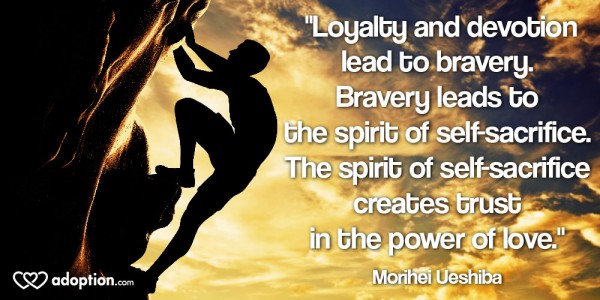If brave were a sound, it would be something loud. It would be a crescendo, a lion’s roar, a sprint in front of a bullet. It is a crashing torrent of white water. Brave has fire. But sometimes, brave is a smoldering coal of resolve. It can trickle like a brook and shape the earth moment by moment. It is as quiet as a sigh, still as a stare. This quieter breed resides in the hearts of birth mothers.
For these women, I offer an anthem of courage. I offer a reflection of a deed for each letter of “brave.”
Birth
When my doctor came to check on me after eleven hours of labor, I had just woken from an epidural nap. My phone was charging in the opposite corner, my family was checking in to the hotel, and I hadn’t yet called the parents-to-be. I hadn’t made much progress and didn’t expect the doctor to have anything new to say. But when he said that the baby was crowning, I shook involuntarily. I said, “I can’t do this.”
After a point, giving birth is mostly inevitable. But the most fundamental part of being a birth mother–having the baby–is still a choice. Making it through nine long months and enduring child birth are far from small feats. Choosing life for your baby is brave.
Relinquishment
Layered in homemade sweaters and blankets, I buckled my baby into his car seat two days after the birth. As the nurse rolled the wheelchair into the elevator, I looked into his peaceful face. Silent tears rolled down my face, and I felt I carried the moon on my lap. To my weak body, he was as heavy as the moon. He was the heaviest thing I’ve ever lifted, and the walk from my chair to his car was the longest I’ve ever walked. The drive home, away from him, was the furthest of my life.
In a single act, I did all that I could for him. For many birth mothers, physically placing their baby with another is the hardest thing they ever do. Coupled with signing the relinquishment of rights, placing your child is immensely trying; making it through the process to secure his or her well-being is astonishingly selfless and brave.
Addressing Grief
My son was born just before the holidays. My 18th birthday, Halloween, Thanksgiving, Christmas, New Year’s. . . Each came and went without much fanfare. Although the continued support of a well-wishing family enveloped me, every quiet night was a chance for my arms to feel too light and too empty. After the initial panic, when my body frantically searched for its companion, months of stupor and sleepiness pacified me. Even when my vitality returned, part of me remained unhappily frozen and numb.
It’s easy to try to bury your pain in denial or use more insidious forms of distraction. But until you reach into your heart and address the grief, you will be perpetually unable to heal. Before you can start allowing yourself to be happy, you must first address your wounds. Having the willingness to face what’s hurting demonstrates courage.
Valuing Yourself
I remember nudging myself into dating again after placement. I went out to dinner with a slightly older man I’d met through church. Although the experiences of the prior year had left me skittish, I nursed a secret hope that I would quickly stumble upon my true love. My goal was another baby–in the “right” way–as soon as possible. The fallacies of my intentions aside, I quickly found that valuing what I really wanted and needed was more important than easing my sadness. While he was a gentleman on our date, he soon showed signs of possessiveness and clinginess. In ending the brief involvement, I proved that being valued was a high priority.
Realize that you’re strong. Often, we are our own worst enemy, and we blame ourselves for all that’s wrong: “If only I’d been financially independent, I could have kept him.” “If I were a better person, I could have parented.” Rather than consider what could have been, recognize where you are. Learning to love yourself in spite of your flaws is easier said than done. But when you recognize how valuable you are and will be, it becomes easier to make choices that nurture you. Put the bat down; you don’t need to beat yourself up. Instead, cherish you.
Embrace Love
In the spring after placement, I became an aunt to a sweet baby girl. When I went to the hospital after she was born, I felt joy and anxiety in equal measures; While it felt so right to have another newborn near my heart, I was afraid to bond with her. As the weeks went by and she reached certain milestones, I would both weep and celebrate. Being with her is like picking cotton: above the cutting reminder of the companionship I lost is the expansive softness of the beautiful niece I’ve gained.
Many birth mothers feel that they have lost their right to motherhood. This can encompass far more than the right to parent; you may not feel permission to be maternal in any capacity. You may fear bonding to a child or even interacting with one because of an inevitable “goodbye,” reminiscent of placement. Go at your own pace, but do not shrink away from this pure and special kind of love. Be willing to feel joy, even if you know sorrow waits at the door. Have the courage to take a risk–fall in love.
Sometimes, being brave is done all at once, in a matter of moments. Sometimes, it’s a long-term hike on the high road. Often, “brave” is a way of life and a habit. Acknowledge what you’ve done as a birth mother, and continue to cultivate “brave” as part of who you are.

